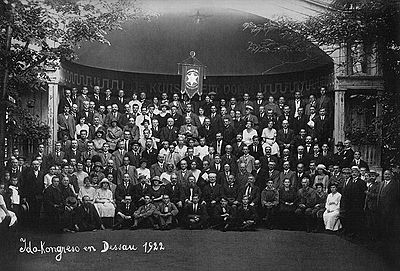Ido facts for kids
Quick facts for kids Ido |
||||
|---|---|---|---|---|
 |
||||
| Created by | Delegation for the Adoption of an International Auxiliary Language | |||
| Date | 1907 | |||
| Setting and usage | International auxiliary language | |||
| Users | 100–200 (2000) | |||
| Purpose |
constructed language
|
|||
| Sources | based on Esperanto1894 | |||
| Official status | ||||
| Regulated by | Uniono por la Linguo Internaciona Ido | |||
| Linguasphere | 51-AAB-db | |||
|
||||
Ido is a constructed language. This means it's a language that someone created on purpose, instead of developing naturally over time. Ido was made in 1907. It's like a "reformed" version of another constructed language called Esperanto.
A group of people created Ido because they thought Esperanto was too hard to become a language spoken all over the world. They didn't like how Esperanto used special marks (called diacritics) over some letters. These marks made it tricky to type. They believed a world language should be easy to learn and write for everyone.
Ido isn't as popular as Esperanto, but about 100 to 200 people around the world still speak it. These speakers often meet at a conference every year to speak Ido together.
Contents
Why Ido is Easy to Learn
Ido is designed to be simple to learn for several reasons:
- Simple Spelling: The spelling in Ido is very straightforward and always follows the same rules. For example, in English, the letters "ough" sound different in words like doughnut, tough, and through. In Ido, each letter always makes the same sound. So, skolo is always pronounced "sko-lo," and multa is "mool-ta."
- Regular Verbs: Action words, called verbs, always act the same way in Ido. In English, we say "I learn," "you learn," "she learns" – the verb changes. But in Ido, the verb stays the same for everyone. For example, "Me lernas, tu lernas, ni lernas, el lernas" all mean "I learn, you learn, we learn, she learns."
- Looks Like Other Languages: Ido shares many words with other languages, especially European ones. If you know English, French, or Spanish, you might understand some Ido words even without studying. For example, Me lernas kun mea amiko en la skolo means "I learn with my friend in the school." You can see that 'me' is like 'me,' 'lernas' is like 'learn,' and 'skolo' is like 'school.' If you know French, 'amiko' (friend) looks like 'ami' or 'amie.' It's also similar to the Italian word 'amico' and the Spanish/Portuguese word 'amigo.'
How Ido Words are Made
Every word in Ido comes from a smaller part called a root word. A root word has a main part (the root) and an ending. You can take a root and add different endings or beginnings to make new words.
For example, urbo means "city." The root of urbo is urb-. If you add -estro (which means "leader") to the end, it becomes urbestro. This new word means "mayor" (the leader of a city). You can also add something before the root. Chef- means "chief" or "leader." If you put chef- before urbo, it becomes chefurbo, which means "capital city."
Here are some common endings in Ido:
- -o : Used for a single noun (a person, place, or thing).
- Example: libro (book), amiko (friend).
- -i : Used for plural nouns (more than one).
- Example: libri (books), amiki (friends).
- -a : Used for an adjective (a word that describes something).
- Example: rapida (fast), kurta (short).
- -e : Used for an adverb (a word that describes how an action is done).
- Example: rapide (quickly), kurte (shortly, briefly).
- -ar : Used for a verb (action word) in its basic form, like "to go" or "to see." This is called the present tense infinitive.
- Example: irar (to go), vidar (to see).
- -is : Used for a verb in the past tense (something that happened).
- Example: iris (went), vidis (saw).
- -as : Used for a verb in the present tense (something happening now).
- Example: iras (go, goes), vidas (see, sees).
- -os : Used for a verb in the future tense (something that will happen).
- Example: iros (will go), vidos (will see).
- -us : Used for a verb in the conditional form (like the English word "would").
- Example: irus (would go), vidus (would see).
- -ez : Used for a verb when you are telling someone to do something (an imperative).
- Example: irez! (Go!), videz! (See!).
Pronouns in Ido
Pronouns are words like I, you, he, she, it, we, and they. They replace nouns. Ido was created from Esperanto, and in Esperanto, all pronouns end in -i. The people who made Ido thought this made them sound too similar, which could be confusing.
They also decided to have two ways to say "you," just like many other languages do. One way is for friends, and another is for people you don't know well. Finally, they created a pronoun that can mean "he" or "she." Some languages, like Finnish and Estonian, also have a pronoun like this.
Here is a chart showing pronouns in English, Esperanto, and Ido:
| singular (one) | plural (more than one) | general | |||||||||
|---|---|---|---|---|---|---|---|---|---|---|---|
| first | second | third | first | second | third | ||||||
| familiar (with friends) | formal (people whom one does not know) | men | women | objects | he or she | ||||||
| English | I | Archaic, Dialectal: thou Modern: you |
you | he | she | it | s/he | we | you | they | one |
| Esperanto | mi | ci | vi | li | ŝi | ĝi | ĝi | ni | vi | ili | oni |
| Ido | me | tu | vu | il(u) | el(u) | ol(u) | lu | ni | vi | li | on(u) |
Ido and Esperanto: A Comparison
Ido came from Esperanto, so they look very similar. Esperanto has more speakers than Ido. Because of this, most people who speak Ido first learned Esperanto. Then they found out about Ido.
Sometimes, Idists (people who speak Ido) and Esperantists (people who speak Esperanto) have different ideas about how their languages should work. But they both agree that creating a language everyone can learn is a great idea. Most Idists and Esperantists can understand a lot of each other's language.
Samples of Ido
Here are some examples of the Ido language.
From The Little Prince
Below is a small part of the famous book The Little Prince, which is called La Princeto in Ido.
CHAPITRO XVII
- Bona nokto ! – dicis la surprizata princeto.
- Bona nokto ! – dicis la serpento.
- Adsur qua planeto me falis ? – questionis la princeto.
- Adsur Tero, sur Afrika. – respondis la serpento.
- Ha !... Kad esas nulu sur Tero ?
- To esas la dezerto, e nulu esas sur la dezerti. Tero esas tre granda – dicis la serpento.
- La princeto sideskis sur stono e levis lua okuli a la cielo.
- Me questionas a me – lu dicis- ka la steli intence brilas por ke uladie singlu povez trovar sua stelo. Videz mea planeto, olu esas exakte super ni... ma tre fore !
- Olu esas bela planeto – dicis la serpento-. Por quo vu venis adhike ?
- Esas chagreneto inter floro e me – dicis la princeto.
- Ha ! – dicis la serpento.
- E la du permanis silence.
- Ube esas la personi ? – klamis fine la princeto-. Onu esas kelke sola sur la dezerto...
- Inter la personi onu anke esas sola – dicis la serpento.
- La princeto regardis la serpento longatempe.
- Vu esas stranja animalo ! – dicis la princeto-. Vu esas tam tenua kam fingro...
- Yes, ma me esas plu potenta kam fingro di rejo – dicis la serpento.
- La princeto ridetis.
- Me ne kredas ke vu esas tre potenta, mem vu ne havas pedi... nek vu povas voyajar...
- Me povas transportar vu plu fore kam navo -dicis la serpento.
- Ed olu spulis la maleolo di la princeto, same kam ora braceleto.
- Ta quan me tushas retroiras a la tero deube lu venis. Ma vu esas pura e vu venas de stelo...
- La princeto nulon respondis.
- Me kompatas vu, qua esas tante sola sur ta harda granita Tero. Me povas helpar vu se vu sentas nostalgio a vua planeto. Me povas...
- Ho ! – dicis la princeto-. Me bone komprenis, ma pro quo vu sempre parolas enigmatoze ?
- Me solvas omna enigmati – dicis la serpento.
- E la du permanis silence.
Mea vido-cirklo (My Horizon)
This is a song by a bard (a poet and singer) from Russia named Alexandr Sukhanov. He used words from the poetry of another Russian person named Yunna Mortis. This is the Ido version, which is sung with a guitar. (listen)
- Me nule savas la Angla, la Franca, la Greka,
- Mea vid-cirklo do restas sat mikra e streta -
- En mea vid-cirklo trovesas nur flori, arbori,
- Nur tero e maro, aero, fairo, amoro.
- Me nule savas la Dana e la Portugala,
- Mea vid-cirklo restas sat infantala -
- Nur joyi rapide pasant', bruligiva aflikto,
- Nur esperi, e timi noktal' es en mea vid-cirklo.
- Me savas nek la Sanskrito e nek la Latina,
- Mea vid-cirklo es ancien-mod' quale tino
- Nur morto e nasko homala, nur grani ed astri
- Aden mea vid-cirklo penetras e standas sat mastre.
- Mea savo artala esas fakultativa.
- Mea vid-cirklo restas presk' primitiva -
- En olu es nia afero intima, interna
- Por ke kun homaro la Tero flugadez eterne.
- Mea vid-cirklon restriktas nur timi, esperi,
- En olu trovesas nur amo, nur maro e tero.
- Aden mea vid-cirklo penetras e standas sat mastre
- Nur morto e nasko homala, nur grani ed astri.
Ido Conferences
People who speak Ido gather for a few days each year to meet and speak the language together. Most Ido speakers live in Europe, so these conventions (meetings) usually happen there.
Images for kids
See also
 In Spanish: Ido para niños
In Spanish: Ido para niños
 | Madam C. J. Walker |
 | Janet Emerson Bashen |
 | Annie Turnbo Malone |
 | Maggie L. Walker |


